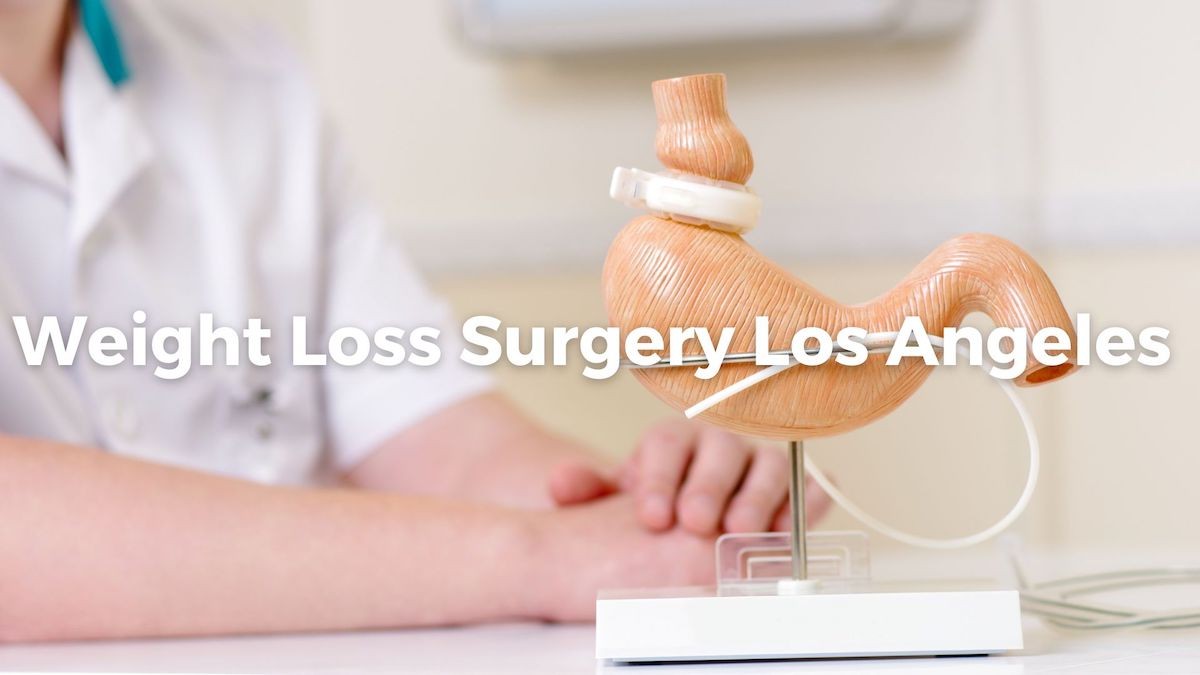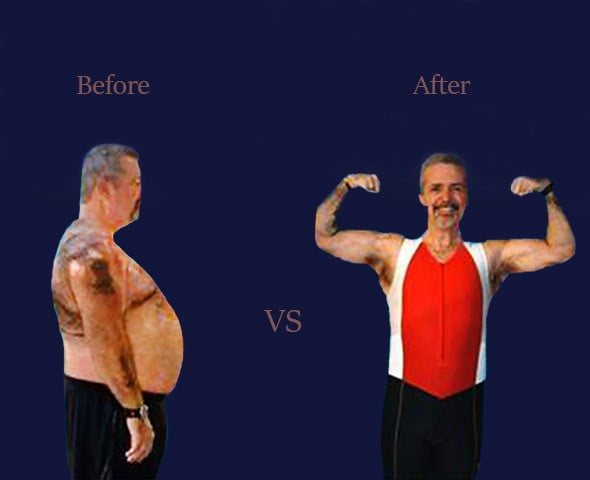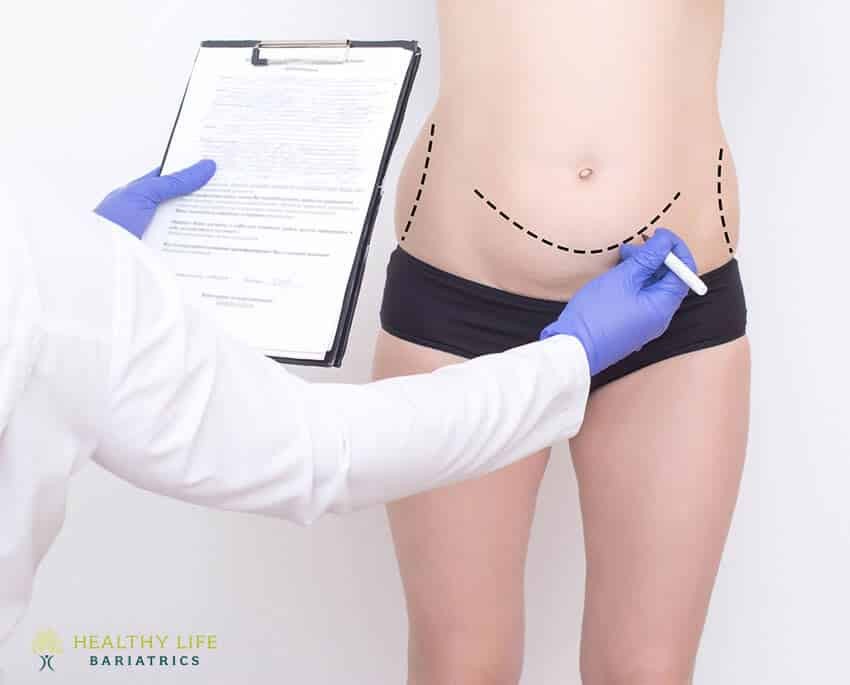Understanding Gastric Sleeve West Hollywood: An Overview
Gastric sleeve surgery, also known as sleeve gastrectomy, is a significant surgical intervention primarily used to treat morbid obesity. This procedure has gained popularity due to its effectiveness in weight reduction and relative simplicity compared to other bariatric surgeries. Understanding gastric sleeve surgery is crucial for patients considering this option for weight loss and health improvement.
The Essence of the Procedure
Gastric sleeve surgery involves the removal of approximately 80% of the stomach, leaving a tube-like stomach "sleeve" that is significantly smaller in capacity. This drastic reduction in stomach size limits food intake and reduces hunger by affecting the hormones that control appetite. Unlike gastric bypass, the sleeve gastrectomy is purely restrictive in nature, meaning it doesn't alter the absorption of nutrients by re-routing the intestines.


Indications and Eligibility For Gastic Sleeve West Hollywood
Candidates for Gastic Sleeve West Hollywood typically include individuals with a Body Mass Index (BMI) of 40 or higher, or those with a BMI of 35-39 accompanied by obesity-related health conditions such as type 2 diabetes, hypertension, or sleep apnea. The decision to undergo this surgery should be made after thorough evaluation by a healthcare team, and patients must demonstrate a commitment to lifestyle changes and follow-up care.
The Surgical Procedure
Performed under general anesthesia, gastric sleeve surgery is usually done laparoscopically, involving small incisions and a camera to guide the surgeon. This minimally invasive approach leads to faster recovery, less pain, and lower risk of complications like infections or hernias compared to open surgery. The procedure typically takes about one to two hours.


Risks and Considerations of Gastric Sleeve West Hollywood
sleeve surgery is significant and sustained weight loss. Patients often experience a 50-70% reduction in excess body weight within two years post-surgery. This weight loss contributes to the improvement or resolution of obesity-related comorbidities, including diabetes, hypertension, and obstructive sleep apnea. Additionally, patients report enhanced quality of life and mental health improvements.
As with any major surgery, gastric sleeve surgery carries risks. Potential complications can include bleeding, infection, and issues related to anesthesia. Long-term risks may involve nutritional deficiencies, acid reflux, and in rare cases, sleeve dilation which can lead to weight regain. It's vital for patients to understand these risks and engage in lifelong nutritional follow-up and supplementation as recommended.
Lifestyle Changes Post-Surgery
Successful outcomes hinge not just on the surgery but also on the patient's commitment to lifestyle changes. Postoperative dietary guidelines include a phased approach to eating, starting with liquids and gradually introducing solid foods. Patients are advised to adhere to a high-protein, low-carb diet, and avoid high-calorie liquids and snacks. Regular exercise and support group participation are also integral to long-term success.


Benefits and Expected Outcomes of Gastric Sleeve West Hollywood
Gastric Sleeve is significant and sustained weight loss. Patients often experience a 50-70% reduction in excess body weight within two years post-surgery. This weight loss contributes to the improvement or resolution of obesity-related comorbidities, including diabetes, hypertension, and obstructive sleep apnea. Additionally, patients report enhanced quality of life and mental health improvements.
The Gastric Sleeve Procedure: Step-by-Step Explanation
Gastric sleeve surgery, clinically known as sleeve gastrectomy, is a well-established bariatric procedure designed for significant weight loss. This discussion provides a step-by-step explanation of the procedure, elucidating its various stages and the technical aspects involved.
Preoperative Assessment
Before the gastric sleeve procedure, patients undergo a comprehensive preoperative assessment. This includes medical evaluations to ensure they are fit for surgery, nutritional and psychological counseling, and education about the procedure and the necessary lifestyle changes post-surgery. Preoperative tests often include blood tests, imaging studies, and cardiovascular evaluations.


Anesthesia and Incision of Gastric Sleeve West Hollywood
On the day of the surgery, the patient is placed under general anesthesia. Once the anesthesia takes effect, the surgeon makes several small incisions in the abdomen. These incisions are keyhole-sized, facilitating a minimally invasive approach known as laparoscopy. This technique reduces recovery time and lessens the risk of complications compared to traditional open surgery.
Insertion of Laparoscopic Instruments
Through these incisions, the surgeon inserts laparoscopic instruments, including a camera that projects images onto a monitor, providing a clear view of the stomach and surrounding organs. This enhanced visibility is crucial for precision and safety during the procedure.


Resection of the Stomach
The core of the procedure involves resecting, or cutting away, a large portion of the stomach. Approximately 75-80% of the stomach is removed, leaving a narrow, sleeve-like tube. This part of the surgery demands meticulous surgical skills to ensure the remaining stomach is of the right size and shape and that the resection is done safely without damaging surrounding tissues.
Formation of the Gastric Sleeve West Hollywood
After the larger portion of the stomach is removed, the remaining section is sealed with surgical staples, forming the "sleeve". It's crucial that this newly formed stomach sleeve is leak-proof. Surgeons often test this by introducing a dye or saline solution to check for leaks.


Closing the Incisions
Once the gastric sleeve is successfully formed, the laparoscopic instruments are removed, and the small incisions in the abdomen are closed with sutures or surgical glue. These incisions typically heal relatively quickly and leave minimal scarring.
Recovery From Gastric Sleeve West Hollywood
After the surgery, patients are moved to a recovery area where they are closely monitored as they come out of anesthesia. Patients generally stay in the hospital for a few days post-surgery. Pain management, fluid intake, and gradual mobilization are key components of immediate postoperative care.


Diet and Lifestyle Changes
Post-surgery, patients follow a strict dietary plan that starts with liquid foods and gradually progresses to solid foods. This diet is crucial for the healing process and for adapting to the new stomach size. Long-term dietary changes, regular exercise, and lifestyle modifications are essential to achieve and maintain the desired weight loss results.
Follow-Up and Monitoring
Regular follow-up appointments are crucial to monitor the patient's recovery, weight loss progress, and nutritional status. These appointments also provide an opportunity for addressing any complications or concerns and for reinforcing the importance of lifestyle changes.

Eligibility Criteria for Gastric Sleeve West Hollywood: Who is a Candidate?
Gastric sleeve surgery, also known as a sleeve gastrectomy, is a type of bariatric surgery that has become increasingly popular as a method for achieving significant weight loss. However, not everyone is a suitable candidate for this procedure. Understanding the eligibility criteria is crucial for both patients and healthcare providers to determine who can benefit most from this surgery.
Body Mass Index (BMI) Requirements
The primary criterion for gastric sleeve surgery is often based on Body Mass Index (BMI). Generally, individuals with a BMI of 40 or higher are considered eligible. This typically indicates that a person is about 100 pounds overweight for men and 80 pounds for women. Additionally, those with a BMI between 35 and 39 may also qualify if they have obesity-related health conditions such as type 2 diabetes, high blood pressure, or obstructive sleep apnea.

Obesity-Related Health Conditions
Patients who suffer from serious health problems related to obesity, such as heart disease, type 2 diabetes, severe sleep apnea, and hypertension, are often considered candidates for gastric sleeve surgery. This surgery can significantly reduce the severity of these conditions and, in some cases, may even lead to their resolution.
Age Considerations
Most bariatric surgery candidates are typically between the ages of 18 and 65. However, exceptions exist, and decisions are often made on a case-by-case basis, particularly for adolescents with severe obesity or older adults who are in good health.
Previous Weight Loss Efforts
Candidates are usually those who have attempted to lose weight through diet and exercise but have been unsuccessful in achieving or maintaining a healthy weight. A documented history of weight loss efforts is often required to demonstrate that surgery is a necessary intervention.

Psychological Evaluation
Mental health plays a crucial role in the success of bariatric surgery. Candidates must undergo a psychological evaluation to ensure they are mentally prepared for the surgery and the subsequent lifestyle changes. Conditions such as untreated depression, bipolar disorder, or severe eating disorders may disqualify a candidate.
Understanding and Commitment
Candidates must be fully informed about the risks and benefits of the surgery, the changes in lifestyle and eating habits required, and the need for follow-up care. A strong commitment to long-term dietary changes, exercise, and regular medical follow-up is essential for the success of the surgery.
Absence of Drug or Alcohol Abuse
Individuals with a current drug or alcohol abuse problem are typically not considered suitable candidates for the surgery. Substance abuse can complicate both the surgery and the recovery process.
No Uncontrolled Endocrine Disorders
Certain endocrine disorders, such as uncontrolled thyroid disease, can affect weight and should be managed before considering bariatric surgery.
Preoperative Care and Preparation For Gastric Sleeve West Hollywood: Are You Ready?
Preoperative care and preparation are crucial components in the journey towards gastric sleeve surgery. This process not only ensures the patient's readiness for the surgery but also lays the foundation for a successful postoperative outcome. Effective preparation involves several key steps and considerations, each playing a vital role in the overall process.

Comprehensive Medical Evaluation
The first step in preoperative preparation is a thorough medical evaluation. This includes a detailed history and physical examination, along with necessary laboratory tests and imaging studies. The aim is to assess the patient's overall health status, identify any potential risk factors, and ensure that they are medically fit for surgery. Special attention is given to the evaluation of cardiac and pulmonary health, as these are critical for anesthesia and surgical recovery.
Nutritional Assessment and Diet Changes
Patients undergo a nutritional assessment conducted by a dietitian specialized in bariatric surgery. The dietitian provides education on the dietary changes required both before and after surgery. Preoperative weight loss is often encouraged as it can reduce the size of the liver, making the surgery safer and easier to perform. Patients are typically advised to follow a high-protein, low-carbohydrate diet and may be put on a liquid diet a few days before the surgery.


Psychological Evaluation
A psychological evaluation is an integral part of the preoperative preparation. This assessment helps to determine the patient’s mental readiness for surgery and the lifestyle changes that follow. The evaluation also screens for any untreated mental health issues, such as depression or eating disorders, that could impact the surgery's success.
Patient Education and Counseling
Education is a key aspect of preparation. Patients receive detailed information about the procedure, the risks and benefits, the recovery process, and the long-term lifestyle changes required. Understanding these elements helps patients set realistic expectations and prepares them mentally and emotionally for the journey ahead.


Medication Management
Managing existing medications is a critical part of preoperative preparation. Some medications, especially those that affect blood clotting or blood sugar levels, may need to be adjusted or temporarily discontinued. Patients should provide a complete list of their medications, including over-the-counter drugs and supplements, to their healthcare provider.
Lifestyle Modifications
Patients are encouraged to adopt healthier lifestyle habits before surgery. This includes quitting smoking, as smoking can increase the risk of surgical complications and hinder healing. Regular physical activity is also promoted to improve surgical outcomes and enhance overall health.


Arranging Postoperative Support
Preparing for the post-surgery period is just as important as preparing for the surgery itself. Patients should plan for their recovery at home, including arranging for help with daily activities and ensuring they have a support system in place.
Preoperative Fasting Gastric Sleeve West Hollywood
Patients are typically required to fast (not eat or drink) for a certain period before surgery to reduce the risk of complications during anesthesia.

Anesthesia and Surgical Techniques
Gastric sleeve surgery, or sleeve gastrectomy, is a complex bariatric procedure that requires a sophisticated approach to anesthesia and surgical techniques. This discussion delves into the specifics of anesthesia administration and the state-of-the-art surgical methods employed in gastric sleeve surgery, underlining their significance in ensuring patient safety and optimizing surgical outcomes.
Anesthesia in Gastric Sleeve West Hollywood
Preoperative Anesthesia Assessment: Prior to surgery, patients undergo a thorough anesthesia evaluation. This includes a review of medical history, physical examination, and necessary investigations to assess the risk factors associated with anesthesia. Special attention is given to respiratory and cardiovascular systems, especially in patients with obesity-related comorbidities.
Anesthetic Technique:
Gastric sleeve surgery is performed under general anesthesia. The anesthetic agents used are carefully selected to maintain stable hemodynamics and facilitate rapid postoperative recovery. The anesthesiologist administers a combination of intravenous medications and inhalational agents to induce a state of unconsciousness and muscle relaxation.

Airway Management
Managing the airway in obese patients can be challenging due to anatomical variations. Advanced techniques and equipment, such as video laryngoscopes, are often utilized to secure the airway effectively.
Intraoperative Monitoring:
Continuous monitoring of vital parameters such as heart rate, blood pressure, oxygen saturation, and ventilation is crucial throughout the procedure. This ensures immediate detection and management of any anesthetic complications.
Surgical Techniques in Gastric Sleeve West Hollywoods
Laparoscopic Approach: The standard technique for gastric sleeve surgery is laparoscopy, a minimally invasive approach that involves making several small incisions in the abdomen. This method reduces postoperative pain, shortens hospital stay, and minimizes scarring.
Creation of the Gastric Sleeve:
The surgeon removes approximately 75-80% of the stomach along the greater curvature, creating a tubular, sleeve-shaped stomach. Precision is key to ensure that the remaining stomach is not too narrow or too wide.

Use of Stapling Devices
Surgical staplers are used to cut and seal the stomach. The staples must be placed accurately to prevent leakage and bleeding. Surgeons often test the integrity of the sleeve by introducing a colored dye or saline to check for leaks.
Reinforcement of Staple Line
Some surgeons reinforce the staple line with sutures or surgical glue to further reduce the risk of leakage.
Intraoperative Endoscopy
In some cases, an endoscopy is performed during the surgery to assess the sleeve's integrity and rule out any immediate complications.
Postoperative Care and Monitoring Gastric Sleeve West Hollywood
After the surgery, patients are closely monitored as they recover from anesthesia. Pain management, fluid balance, and early mobilization are crucial aspects of postoperative care. The laparoscopic approach typically allows for a faster recovery, and most patients can leave the hospital within a few days.
Postoperative Recovery: What to Expect After Surgery
The postoperative period following gastric sleeve surgery is a critical phase where patients undergo physical and psychological adjustments as they embark on a new lifestyle. Understanding what to expect after surgery is essential for ensuring a smooth recovery and achieving long-term success. This discussion provides a comprehensive overview of the postoperative recovery process.

Immediate Postoperative Period
The immediate recovery after gastric sleeve surgery typically involves a short hospital stay, usually lasting 2-3 days. During this period, patients are closely monitored for any complications, such as bleeding, infection, or issues related to anesthesia.
Fluid Intake
Initially, patients are restricted to a liquid diet. Hydration is crucial, and patients are encouraged to sip small amounts of water or approved liquids frequently.


Physical Activity
Early mobilization is encouraged to reduce the risk of blood clots and to promote healing. Patients are usually able to walk with assistance within a day after the surgery.
Diet Progression
Dietary changes post-surgery are gradual and follow a structured approach: Weeks 1-2 (Liquid Diet): Patients consume clear liquids, followed by full liquids including protein shakes, to meet their nutritional needs. Weeks 3-4 (Pureed Foods): The diet progresses to pureed foods, focusing on protein-rich options. Week 5 and Beyond (Soft then Regular Diet): Soft foods are introduced, gradually transitioning to a regular, balanced diet. Portion control and mindful eating are emphasized.


Long-Term Nutritional Management
Due to the reduced stomach size and changes in digestion, patients must adhere to specific nutritional guidelines: Protein Intake: High protein intake is essential for healing and maintaining muscle mass.
Vitamin and Mineral Supplements
Supplements such as multivitamins, calcium, iron, and vitamin B12 are often necessary to prevent deficiencies.
Avoiding Certain Foods: Patients learn to avoid foods that can cause discomfort, such as those high in sugar, fat, or fibrous.


Physical and Emotional Adjustments
Recovery also involves adapting to changes in body image and lifestyle:
Exercise: Regular physical activity is crucial for weight loss maintenance and overall health. Patients are generally advised to start with light exercises and gradually increase intensity.
Emotional Support
Psychological support is essential as patients adjust to rapid weight loss and lifestyle changes. Counseling and support groups can be beneficial.


Follow-up Care Gastric Sleeve West Hollywood
Regular follow-up visits with the healthcare team are critical for monitoring weight loss, nutritional status, and overall health. These appointments also provide an opportunity to discuss any concerns or complications.
Diet and Nutrition Gastric Sleeve West Hollywood
After undergoing gastric sleeve surgery, patients embark on a new journey that significantly involves modifying their diet and nutrition. This surgery reduces the stomach's size, necessitating a complete overhaul of eating habits to accommodate the new stomach capacity and ensure adequate nutrient intake. The following discussion provides an in-depth look at the dietary and nutritional considerations essential for post-gastric sleeve surgery patients.
The Importance of a Staged Diet
The postoperative diet is typically divided into several stages, each designed to allow the stomach to heal properly and the patient to adapt to their new dietary restrictions:
Stage 1: Liquid Diet – Immediately after surgery, patients are restricted to a liquid diet. This includes clear liquids like water, broth, and unsweetened tea or juice. The focus is on preventing dehydration while allowing the stomach to heal.
Stage 2: Pureed Foods – Usually two weeks after surgery, the diet advances to include pureed foods. These foods should be smooth and free of lumps to ease digestion. Examples include pureed fruits, vegetables, and lean proteins.
Stage 3: Soft Foods – About four weeks post-surgery, patients can start incorporating soft foods. These are easily chewable and include items like soft-boiled eggs, cottage cheese, and cooked vegetables.
Stage 4: Solid Foods – Typically, six to eight weeks after surgery, patients gradually return to eating solid foods. However, the emphasis remains on small portions and nutrient-rich choices.

Nutrient Density and Portion Control
With the reduced stomach capacity, it's crucial that every bite counts nutritionally. Patients are advised to focus on protein-rich foods, fruits, vegetables, and whole grains. Portion control is essential to avoid overstretching the stomach and to aid in weight loss and maintenance.
High Protein Intake
Protein is a key component of the post-gastric sleeve diet. It's essential for healing post-surgery and for maintaining muscle mass during rapid weight loss. Sources of high-quality protein include lean meats, poultry, fish, eggs, dairy products, and plant-based proteins.
Hydration and Fluid Intake
Staying hydrated is important, but patients must learn to drink fluids between meals, not during, to prevent filling up the stomach with liquids instead of nutrient-dense foods.
Vitamins and Minerals Supplementation
Due to the limited intake and potential malabsorption, patients often require lifelong supplementation with multivitamins, calcium, vitamin D, iron, and vitamin B12. Regular blood tests are necessary to monitor for deficiencies.

Mindful Eating Practices
Patients are encouraged to eat slowly, chew their food thoroughly, and be attentive to their body’s fullness cues. This helps in preventing overeating and complications such as nausea and vomiting. Foods high in sugar, fat, and empty calories should be avoided as they can cause dumping syndrome, a condition where food moves too quickly through the stomach and intestines, leading to discomfort.
Long-term Dietary Adjustments
Post-gastric sleeve surgery diet is not just a temporary change but a lifelong commitment. Regular follow-up with nutritionists or dietitians helps patients in adapting to and maintaining these changes.
Long-Term Weight Loss Results: Success Rates and Expectations
Gastric sleeve surgery, also known as sleeve gastrectomy, has become a widely accepted surgical procedure for weight loss. Its popularity stems from its effectiveness in yielding substantial long-term weight loss. However, setting realistic expectations and understanding success rates is crucial for patients considering this surgery.
Understanding Weight Loss Post-Surgery
After gastric sleeve surgery, patients typically experience rapid weight loss initially. This phase usually lasts for about 12 to 18 months post-surgery. On average, patients can expect to lose 60-70% of their excess body weight during this period. However, individual results vary based on factors like pre-surgery weight, age, gender, overall health, and adherence to lifestyle changes.
Factors Influencing Long-Term Success
Several factors play a critical role in determining long-term weight loss success
Adherence to Dietary Guidelines: The success of gastric sleeve surgery is highly dependent on the patient's commitment to dietary changes. Adhering to a balanced, low-calorie diet is crucial for maintaining weight loss.


Exercise Gastric Sleeve West Hollywood
Regular physical activity is essential not only for weight loss but also for overall health improvement. Exercise helps in preserving muscle mass and boosting metabolism. Behavioral Changes: Successful long-term weight management requires significant lifestyle adjustments, including behavioral changes towards eating and exercise.
Follow-Up Care
Regular follow-ups with healthcare providers help in monitoring health, nutritional status, and providing necessary support and guidance.


Average Weight Loss and Success Rates of Gastric Sleeve West Hollywood
The success rates of gastric sleeve surgery are generally high. Studies have shown that most patients maintain significant weight loss for 5 to 10 years post-surgery. However, some degree of weight regain after the initial period of rapid weight loss is common. This regain can be minimized with continued adherence to recommended dietary and lifestyle habits.
Impact on Obesity-Related Health Conditions
Apart from weight loss, gastric sleeve surgery significantly impacts obesity-related comorbidities. Conditions such as type 2 diabetes, hypertension, sleep apnea, and joint pain are often markedly improved or resolved after surgery, enhancing the overall quality of life.


Psychological and Emotional Factors
The psychological and emotional aspects of drastic weight loss are also vital. Patients may experience improved self-esteem and mental health. However, it's also common to face emotional adjustments related to body image changes. Ongoing counseling and support can be beneficial in navigating these changes.
Importance of Realistic Expectations
Setting realistic expectations is key. Not all patients will achieve the same level of weight loss, and some may struggle with weight plateaus or regain. Understanding and accepting that weight loss is a gradual, ongoing process is essential.


Risk of Weight Regain and Its Management
Weight regain can occur, particularly if lifestyle recommendations are not consistently followed. Maintaining contact with the healthcare team, seeking support when needed, and staying committed to a healthy lifestyle are critical for managing and preventing weight regain.
Possible Complications and Risks of Gastric Sleeve West Hollywood
Gastric sleeve surgery, while effective for weight loss, is not without potential risks and complications. Understanding these risks is crucial for patients considering this procedure. Informed patients can make better decisions and recognize early signs of complications, ensuring timely intervention.
Surgical Complications
Bleeding: One of the immediate risks post-surgery is bleeding, either from the staple line or other surgical sites. While rare, if significant, it may require additional intervention.
Staple Line Leaks: Leaks from the staple line where the stomach has been divided are a serious complication. They can lead to infections and require urgent medical attention.
Stricture Formation: Occasionally, narrowing of the sleeve can occur, leading to difficulty in swallowing or food passage.
Infections: As with any surgery, there is a risk of infections at the incision sites or internally.

Postoperative Complications
Nausea and Vomiting: Common in the early postoperative period, these symptoms are usually temporary but can be severe in some cases.
Gastroesophageal Reflux Disease (GERD): Some patients may experience an increase in acid reflux or heartburn after the surgery.
Nutritional Deficiencies: Given the reduced stomach size and potential changes in absorption, deficiencies in vitamins and minerals, particularly iron, calcium, vitamin B12, and vitamin D, are possible.
Dumping Syndrome: This condition occurs when food moves too quickly from the stomach to the small intestine, causing symptoms like nausea, vomiting, dizziness, and diarrhea.
Long-term Risks of Gastric Sleeve West Hollywood
Weight Regain: While gastric sleeve surgery aids in significant weight loss, there is a risk of weight regain, especially if dietary and lifestyle recommendations are not adhered to.
Hypoglycemia: Rarely, patients may experience low blood sugar levels, which can be challenging to manage.
Psychological Impact: Mental health issues, such as depression or anxiety, may arise or worsen due to the drastic lifestyle changes and body image perceptions post-surgery.
Anesthetic Risks
As with any surgery requiring general anesthesia, there are risks associated with the anesthesia itself, particularly in patients with obesity-related health conditions like sleep apnea or heart disease.

Mortality Risk
Although very low, there is a mortality risk associated with gastric sleeve surgery, as with any major surgical procedure. This risk is significantly reduced in high-volume centers with experienced surgical teams.
Importance of Choosing a Qualified Surgical Team
The risk of complications can be greatly reduced by choosing an experienced surgical team and a facility well-equipped to handle bariatric patients. A thorough preoperative evaluation and adherence to recommended postoperative guidelines are also vital in minimizing risks.
Lifestyle Changes Post-Gastric Sleeve West Hollywood
Gastric sleeve surgery is a transformative procedure that necessitates significant lifestyle adjustments for lasting success. The surgery is not just a solution for weight loss; it's a catalyst for a complete lifestyle overhaul. Understanding and committing to these changes are crucial for maintaining the weight loss and health benefits achieved through the surgery.
Dietary Adjustments
Smaller, More Frequent Meals: Due to the reduced stomach size, patients must adapt to eating smaller portions. Typically, this involves consuming several small meals throughout the day instead of three large ones.


Nutrient-Rich Foods:
Emphasis is placed on protein-rich foods to aid in healing and maintaining muscle mass. Fruits, vegetables, and whole grains are also important for providing essential vitamins and minerals. Mindful Eating: Patients learn to eat slowly and chew their food thoroughly. This helps in digestion and in recognizing fullness cues to prevent overeating.
Hydration
Staying well-hydrated is crucial, but patients are advised to avoid drinking fluids during meals to prevent filling their reduced stomach volume with liquids instead of nutrient-dense foods.


Regular Physical Activity
Gradual Introduction of Exercise: Post-surgery, patients are encouraged to start with light activities like walking. As they recover, more structured exercise routines can be incorporated. Consistent Exercise Regimen: Engaging in regular physical activity is key for sustained weight loss and overall health improvement. Activities can range from aerobic exercises to strength training, depending on individual preferences and physical capabilities.
Mental Health and Emotional Well-being
Psychological Support: The drastic body changes and lifestyle adjustments can be overwhelming. Seeking psychological support or counseling can be beneficial in navigating these changes. Support Groups: Many find it helpful to join support groups with other bariatric surgery patients to share experiences and receive encouragement.


Long-term Medical Follow-up
Regular Check-ups: Ongoing medical follow-up is important to monitor weight loss progress, nutritional status, and general health.
Vitamin and Mineral Supplements: Due to potential nutrient deficiencies, regular intake of prescribed supplements such as multivitamins, calcium, iron, and vitamin B12 is necessary.
Avoiding Harmful Substances
Alcohol and Caffeine: Consumption of alcohol and caffeine should be limited, as they can have different effects on the smaller stomach and may contribute to dehydration.
Smoking Cessation: Smoking is discouraged as it can hinder the healing process and increase the risk of complications.


Life-long Commitment
Consistency and Perseverance: The success of gastric sleeve surgery largely depends on the patient's ability to adhere consistently to these lifestyle changes. It requires a lifelong commitment to healthy living.
Psychological Aspects of Gastric Sleeve West Hollywood
Gastric sleeve surgery, while primarily a physical intervention for weight loss, entails significant psychological implications. The journey from preoperative preparation to long-term postoperative adjustment encompasses various mental and emotional challenges and transformations. Understanding these psychological aspects is crucial for a holistic approach to the treatment of obesity.
Before surgery, patients undergo a psychological evaluation to assess their understanding of the surgery, its implications, and their readiness for lifelong lifestyle changes. This evaluation also identifies any untreated mental health issues like depression or eating disorders. It’s essential for patients to have realistic expectations regarding weight loss, potential complications, and the need for lifestyle modifications. Unrealistic expectations can lead to dissatisfaction and mental distress post-surgery.
Immediately following surgery, patients often experience a sense of elation and relief. The prospect of weight loss can bring hope and a positive outlook on life. As the body undergoes rapid changes, patients might struggle with their evolving identity and how they are perceived by others. Some might experience mood swings, confusion, or anxiety during this adjustment period.
Many patients have faced stigma and discrimination due to their weight, impacting their self-esteem and body image. Gastric sleeve surgery offers hope, but it also brings to the forefront complex feelings about one's body and identity. Obesity is often accompanied by mental health conditions like depression, anxiety, and binge eating disorder. Addressing these conditions is vital for a successful surgical outcome.

Immediately following surgery, patients often experience a sense of elation and relief. The prospect of weight loss can bring hope and a positive outlook on life. As the body undergoes rapid changes, patients might struggle with their evolving identity and how they are perceived by others. Some might experience mood swings, confusion, or anxiety during this adjustment period.
Significant weight loss can lead to changes in body shape, including loose skin, which might affect the patient's body image and self-esteem. Patients may take time to mentally adjust to their new body, and this discrepancy can sometimes lead to body image disorders.
Adhering to a strict diet can be challenging. Feelings of deprivation or frustration can arise, requiring patients to develop new coping mechanisms that don't involve food. Incorporating regular physical activity can be a new experience for many. While it boosts mood and health, it may also bring challenges in motivation and consistency.
Weight loss can affect personal relationships. While some relationships may improve, others might become strained due to changes in lifestyle or jealousy. Patients often notice a change in how they are treated by others post-weight loss, which can be both uplifting and unsettling.
Some individuals may develop 'transfer addictions', replacing overeating with other addictive behaviors like alcohol abuse, smoking, or gambling. Long-term counseling or therapy can be beneficial in helping patients adjust to their new lifestyle and body image, and in addressing any underlying or emerging mental health issues. Participation in support groups with other bariatric surgery patients can provide a sense of community, understanding, and shared experiences, which is beneficial for emotional well-being.

Some patients may experience weight regain, which can lead to feelings of failure, guilt, or depression. Professional help might be needed to address these feelings and to get back on track. It’s important to focus on overall health improvements rather than just the number on the scale.
Many patients report improvements in self-esteem, body image, and overall quality of life. Weight loss and improved health often lead to reductions in symptoms of depression and anxiety. The psychological journey associated with gastric sleeve surgery is complex and multifaceted. It's not only about losing weight but also about undergoing a profound emotional and psychological transformation. Adequate psychological support, both pre- and post-surgery, is crucial for addressing these challenges. This support helps patients navigate the emotional ups and downs, adjust to their new lifestyle and body image, and maintain their mental health. Ultimately, the surgery is a tool, not just for physical transformation, but for a holistic change that encompasses both body and mind, leading to improved overall well-being.
Costs and Insurance Considerations for Gastric Sleeve West Hollywood
Gastric sleeve surgery, also known as sleeve gastrectomy, has emerged as a popular and effective bariatric surgery option for individuals struggling with severe obesity. However, alongside the medical and psychological considerations, one of the key aspects that potential patients must navigate is the financial aspect, including the costs and insurance considerations associated with this procedure.
The cost of gastric sleeve surgery can vary widely depending on a multitude of factors. Geographic location is a significant determinant, with costs varying between countries and even within regions of the same country. In the United States, for instance, the price can range anywhere from $15,000 to $25,000 or more. This variation is influenced by factors such as the hospital's geographical location, the surgeon's fees, which are often linked to their experience and reputation, and the complexity of the patient's medical condition.


Hospital expenses constitute a major portion of the overall cost. These include charges for the operating room, hospital stay, anesthesia, and other medical supplies. The length of hospital stay can also affect the cost, with longer stays resulting in higher charges. Furthermore, preoperative and postoperative care contribute to the total expense. Preoperative care includes consultations, nutritional counseling, psychological evaluation, and necessary medical tests, while postoperative costs encompass follow-up visits, dietetic support, and any additional medical care required for complications or additional treatments.
One of the critical factors influencing the cost is whether the patient opts for surgery in a metropolitan area or a smaller town. Hospitals in major cities often charge more due to higher overhead costs. Additionally, choosing a surgeon with extensive experience or a high success rate in bariatric surgery can also lead to higher fees, though this can be a worthwhile investment considering the surgery's complexity and risks.


Insurance coverage for gastric sleeve surgery is variable and depends on the patient's insurance plan and provider. In many cases, insurance companies require evidence that the surgery is medically necessary. This typically involves documentation of previous weight loss attempts, medical records indicating health conditions related to obesity, and a psychological evaluation.
Some insurance plans may cover a significant portion of the surgery costs, provided that specific criteria are met. These criteria often include a minimum body mass index (BMI), documented history of obesity for a certain period, and previous unsuccessful attempts at weight loss through non-surgical methods. Patients must navigate their insurance plan's stipulations carefully.


It's advisable to get a pre-authorization for the surgery from the insurance provider, which involves submitting the necessary medical documentation to prove the surgery's necessity. However, it's also essential to be aware that even with insurance coverage, there can be out-of-pocket expenses such as deductibles, copayments, and non-covered services.
For those without insurance coverage or with plans that do not cover bariatric surgery, there are alternative financing options. These include medical loans, payment plans arranged directly with the hospital or surgical facility, and healthcare credit cards. Some patients also consider surgery in countries where the costs are significantly lower, known as medical tourism.


While this can be a more affordable option, it's important to thoroughly research the quality of care, surgeon credentials, and the facility's standards before pursuing surgery abroad Another aspect to consider is the long-term financial impact of the surgery. While the upfront cost can be substantial.
many patients find that their overall healthcare costs decrease post-surgery due to the reduction or resolution of obesity-related health conditions like diabetes, hypertension, and sleep apnea. Additionally, the improved quality of life and increased mobility can lead to better employment opportunities and decreased absenteeism from work, contributing positively to the patient's financial situation

Comparing Gastric Sleeve with Other Bariatric Procedures
Bariatric surgery has become a cornerstone in the treatment of morbid obesity and its related health complications. Among the various bariatric procedures, gastric sleeve surgery (sleeve gastrectomy) is one of the most popular. However, it's essential to compare it with other bariatric procedures, such as gastric bypass and adjustable gastric banding, to understand its relative advantages, limitations, and suitability for different patients.
Gastric Sleeve Surgery (Sleeve Gastrectomy)
Gastric sleeve surgery involves the removal of approximately 75-80% of the stomach, leaving a banana-shaped "sleeve" that restricts food intake. It's a purely restrictive procedure, meaning it limits the amount of food the stomach can hold but does not significantly alter the absorption of nutrients. This surgery is favored for its relative simplicity, effectiveness in significant weight loss, and lower complication rates compared to more complex procedures. It also impacts hunger hormones like ghrelin, often resulting in reduced appetite.
Gastric Bypass Surgery (Roux-en-Y Gastric Bypass)
Gastric bypass is a more complex procedure that involves creating a small pouch from the stomach and connecting it directly to the small intestine. This not only restricts food intake but also bypasses a significant portion of the small intestine, leading to reduced nutrient absorption (malabsorption). Gastric bypass is typically more effective in achieving rapid weight loss and has a significant impact on obesity-related conditions like diabetes. However, it carries a higher risk of surgical complications and requires more stringent lifelong nutritional monitoring to avoid deficiencies.

Adjustable Gastric Banding
Adjustable gastric banding involves placing a band around the upper part of the stomach to create a small pouch. The band's tightness can be adjusted by adding or removing saline solution, which allows for a customized level of restriction. This procedure is less invasive than gastric sleeve or bypass and is reversible. However, its popularity has decreased due to lower long-term weight loss effectiveness and higher rates of reoperation compared to other bariatric procedures.
Comparative Effectiveness
In terms of weight loss, gastric bypass often leads to more rapid and slightly greater overall weight loss compared to gastric sleeve surgery. However, gastric sleeve surgery still results in significant and sustainable weight loss for many patients and is less technically challenging. Gastric banding tends to result in slower and less overall weight loss and can have higher failure rates.
Impact on Comorbidities
Gastric bypass is particularly effective in the remission of type 2 diabetes, often leading to immediate improvements post-surgery due to hormonal changes. Sleeve gastrectomy also leads to improvements in or resolution of diabetes, though typically to a slightly lesser degree than bypass. Gastric banding has the least impact on metabolic conditions compared to the other two procedures.
Nutritional Considerations
Nutritional deficiencies are more common and severe after gastric bypass due to the malabsorptive component. Patients undergoing bypass require lifelong nutritional supplementation and regular monitoring. Sleeve gastrectomy patients also need to be conscious of their nutritional intake but generally face a lower risk of deficiencies. Gastric band patients have the least risk for nutritional deficiencies since there's no malabsorption involved.

Recovery and Complication Rates of Gastric Sleeve West Hollywood
The recovery period and risk of complications vary among these procedures. Gastric bypass and sleeve gastrectomy require similar recovery times, but bypass patients may have a slightly higher risk of complications due to the procedure's complexity. Adjustable gastric banding has the shortest recovery time and lowest immediate postoperative risk, but there's a higher chance of needing additional surgeries in the long term.
Reversibility and Adjustability
Gastric banding is the only reversible procedure and allows for adjustability. This can be an advantage for some patients, but the need for regular adjustments and the potential for band-related complications can be drawbacks. Gastric sleeve and bypass are permanent modifications to the gastrointestinal tract.
Lifestyle and Behavioral Changes
All bariatric procedures require significant lifestyle and dietary changes for success. Sleeve gastrectomy and gastric bypass patients typically need more intensive dietary modifications due to the reduced stomach size and, in the case of bypass, malabsorption. Banding requires strict adherence to dietary changes to avoid complications like band slippage or erosion.
Suitability for Different Patients
The choice of procedure depends on various factors, including the patient's health status, the severity of obesity, presence of comorbidities, lifestyle, and personal preferences. Gastric bypass may be more suitable for patients with severe diabetes or gastroesophageal reflux disease. Sleeve gastrectomy can be a good option for patients seeking a less complex surgery with significant weight loss results. Gastric banding might be considered for patients who prefer a reversible procedure and are committed to regular follow-up.
Psychological Impact of Gastric Sleeve West Hollywood
The psychological impact of these surgeries is significant and varies among individuals. While all three procedures can lead to improved quality of life and psychological well-being due to weight loss and health improvement, they also require psychological readiness for lifelong changes and the potential emotional adjustments to rapid weight loss and changing body image.

Patient Testimonials and Success Stories
Patient testimonials and success stories play a vital role in understanding the real-life impact of bariatric surgery. They not only provide insights into the effectiveness of these procedures but also offer a personal touch that statistics alone cannot convey. Hearing about the journeys of individuals who have undergone these transformative surgeries can be both inspiring and informative for those considering similar paths.

While this can be a more affordable option, it's important to thoroughly research the quality of care, surgeon credentials, and the facility's standards before pursuing surgery abroad Another aspect to consider is the long-term financial impact of the surgery. While the upfront cost can be substantial.
many patients find that their overall healthcare costs decrease post-surgery due to the reduction or resolution of obesity-related health conditions like diabetes, hypertension, and sleep apnea. Additionally, the improved quality of life and increased mobility can lead to better employment opportunities and decreased absenteeism from work, contributing positively to the patient's financial situation

West Hollywood
City Council
| Mayor Sepi Shyne | Mayor Pro Tempore John M. Erickson |
| Councilmember Chelsea Lee Byers | Councilmember John Heilman |
| Councilmember Lauren Meister |
Direction
Take Santa Monica Blvd heading east.
Continue on Santa Monica Blvd, then take I-405 S/San Diego Fwy.
Take exit 55A from I-405 S.
Continue on W Olympic Blvd to Century Park E.
Demographics
Median Household income: $89,034
Population: 34,514
2024 EVENTS

Evan Dando with Willy Mason
Date: MAR 1
Time : Fri, 9 – 11 PM
Location : The Roxy Theatre, 9009 Sunset Blvd West Hollywood, CA

Sebastian Bach @ Rainbow Bar & Grill
Date : APR 14
Time : Sun, 1 PM
Location :Rainbow Bar & Grill, 9015 Sunset Blvd West Hollywood, CA

Lola Kirke
Date : MAY 2
Time : Thu, 12 PM
Location :Troubadour, 9081 N Santa Monica Blvd West Hollywood, CA

Tiger Heat - Roar 2024 Final Thursday of the Year
Date : DEC 28, 2024
Time : Thu, Dec 28 – Fri, Dec 29
Location : Stache West Hollywood, 8941 Santa Monica Blvd West Hollywood, CA

Lil Xan at Whisky A Go Go
Date : FEB 29
Time : Thu, 6 – 10 PM
Location : Whisky a Go Go, 8901 Sunset Blvd West Hollywood, CA

Delilah Los Angeles NYE 2024
Date : DEC 31
Time : Dec 31, 2023 – Jan 1, 2024
Location : Delilah, 7969 Santa Monica Blvd West Hollywood, CA

Kottonmouth Kings
Date : MAY 10
Time : Fri, 11 AM
Location : Whisky a Go Go, 8901 Sunset Blvd West Hollywood, CA

Elephant Gym
Date : MAR 9
Time : Sat, 9 – 11 PM
Location : The Roxy Theatre, 9009 Sunset Blvd West Hollywood, CA

Juniper Lounge NYE 2024 at 1 Hotel West Hollywood
Date : DEC 31
Time : Dec 31, 2023 – Jan 1, 2024
Location : Juniper, 8490 Sunset Blvd West Hollywood, CA

Frost Children
Date : FEB 16
Time : Fri, 9 – 11 PM
Location : The Roxy Theatre, 9009 Sunset Blvd West Hollywood, CA

Crawl 'Til The Ball Falls: Sunset Strip NYE Bar...
Date : DEC 31
Time : Sun, 3 – 11 PM
Location : The Den on Sunset - West Hollywood Restaurant & Bar, 8226 Sunset Blvd West Hollywood, CA

Headliners of the OR
Date : JAN 4
Time : Jan 4 – 5, 2024
Location : The Comedy Store, 8433 Sunset Blvd West Hollywood, CA

Daisy World
Date : DEC 31
Time : Dec 31, 2023 – Jan 1, 2024
Location : Juniper, 8490 Sunset Blvd West Hollywood, CA

Miyavi
Date : FEB 13
Time : Feb 3 – 4, 2024
Location : The Roxy Theatre, 9009 Sunset Blvd West Hollywood, CA

Peppermint Club
Date : DEC 31
Time : Dec 31, 2023 – Jan 1, 2024
Location : Peppermint Club, 8713 Beverly Blvd West Hollywood, CA

Robby Krieger
Date : JAN 16
Time : Jan 16 – 17, 2024
Location : Whisky a Go Go, 8901 Sunset Blvd West Hollywood, CA

NYE 2023: 2024 On the Floor
Date : DEC 31
Time : Dec 31, 2023 – Jan 1, 2024
Location : Hotel Ziggy Los Angeles, 8462 W Sunset Blvd West Hollywood, CA

Sam Barber
Date : APR 30
Time : Apr 30 – May 1, 2024
Location : The Roxy Theatre, 9009 Sunset Blvd West Hollywood, CA

2024 New Year Resolution starts at Merois
Date : JAN 6
Time : Sat, 5:30 – 8:00 PM
Location : Merois | West Hollywood, 8430 Sunset Blvd West Hollywood, CA

Christopher
Date : JAN 26
Time : Jan 26 – 27, 2024
Location : The Roxy Theatre, 9009 Sunset Blvd West Hollywood, CA

Andrew Cushin - Waiting for the Rain USA Tour 2024
Date : MAY 22
Time : Wed, 7 – 11 PM
Location : 8713 Beverly Blvd West Hollywood, CA

WEHO NYE Festival 2024
Date : DEC 31
Time : Dec 31, 2023 – Jan 1, 2024
Location : E.P. & L.P., 603 N La Cienega Blvd West Hollywood, CA

Toca Madera West Hollywood New Years Eve 2024
Date : Dec 31
Time : Dec 31, 2023 – Jan 1, 2024
Location : Toca Madera West Hollywood, 8450 W 3rd St West Hollywood, CA

Whisky A Go Go, West Hollywood, CA
Date : JAN 9
Time : Tue, 4 PM
Location : Whisky a Go Go, 8901 Sunset Blvd West Hollywood, CA

Joe DeRosa: I Never Promised You a Rosegarden
Date : Feb 16
Time : Feb 16 – 17, 2024
Location : 8713 Beverly Blvd West Hollywood, CA

Doll
Date : FEB 8
Time : Thu, 6 – 10 PM
Location : Whisky a Go Go, 8901 Sunset Blvd West Hollywood, CA

Casa Madera West Hollywood New Years Eve 2024
Date : Dec 31
Time : Dec 31, 2023 – Jan 1, 2024
Location : Casa Madera West Hollywood, 8440 Sunset Blvd West Hollywood, CA

Alien Ant Farm Tickets
Date : JAN 10
Time : Wed, 6 – 7 PM
Location : Whisky a Go Go, 8901 Sunset Blvd West Hollywood, CA

Uli Jon Roth
Date : APR 3
Time : Wed, 7 – 11 PM
Location : Whisky a Go Go, 8901 Sunset Blvd West Hollywood, CA

Sir Chloe
Date : MAR 30
Time : Sat, 7 – 9 PM
Location : Troubadour, 9081 N Santa Monica Blvd West Hollywood, CA

Soen
Date : JUN 1
Time : Sat, 9 – 11 PM
Location : The Roxy Theatre, 9009 Sunset Blvd West Hollywood, CA

Sam Barber : Till I Return Tour
Date : APR 30
Time : Tuesday
Location : The Roxy Theatre, 9009 Sunset Blvd West Hollywood, CA

Colin James
Date : MAR 15
Time : Fri, 7 – 11 PM
Location : 8713 Beverly Blvd West Hollywood, CA

Powfu
Date : MAR 5
Time : Tue, 8 – 9 PM
Location : The Roxy Theatre, 9009 Sunset Blvd West Hollywood, CA

CMAT
Date : MAR 27
Time : Wed, 8 – 10 PM
Location : The Roxy Theatre, 9009 Sunset Blvd West Hollywood, CA

Julian Marley and the Uprising
Date : JAN 23
Time : Tue, 8 – 10 PM
Location : The Roxy Theatre, 9009 Sunset Blvd West Hollywood, CA

Glenn Hughes, Gilby Clarke
Date : FEB 2
Time : Fri, 7 – 11 PM
Location : Whisky a Go Go, 8901 Sunset Blvd West Hollywood, CA

Em Beihold
Date : MAR 28
Time : Thu, 8 – 10 PM
Location : The Roxy Theatre, 9009 Sunset Blvd West Hollywood, CA

Em Beihold
Date : MAR 29
Time : Fri, 8 – 10 PM
Location : The Roxy Theatre, 9009 Sunset Blvd West Hollywood, CA

Natalie Jane
Date : APR 5
Time : Fri, 8 – 10 PM
Location : The Roxy Theatre, 9009 Sunset Blvd West Hollywood, CA

The Strawberry Alarm Clock
Date : FEB 2
Time : Fri, 7 – 11 PM
Location : Whisky a Go Go, 8901 Sunset Blvd West Hollywood, CA

Annie Bosko
Date : JAN 10
Time : Wed, 7 – 9 PM
Location : Troubadour, 9081 N Santa Monica Blvd West Hollywood, CA

Hookers N Blow
Date : JAN 4
Time : Thu, 5:30 – 6:30 PM
Location : Whisky a Go Go, 8901 Sunset Blvd West Hollywood, CA

Angie McMahon
Date : MAR 15
Time : Fri, 7 – 9 PM
Location : Troubadour, 9081 N Santa Monica Blvd West Hollywood, CA


